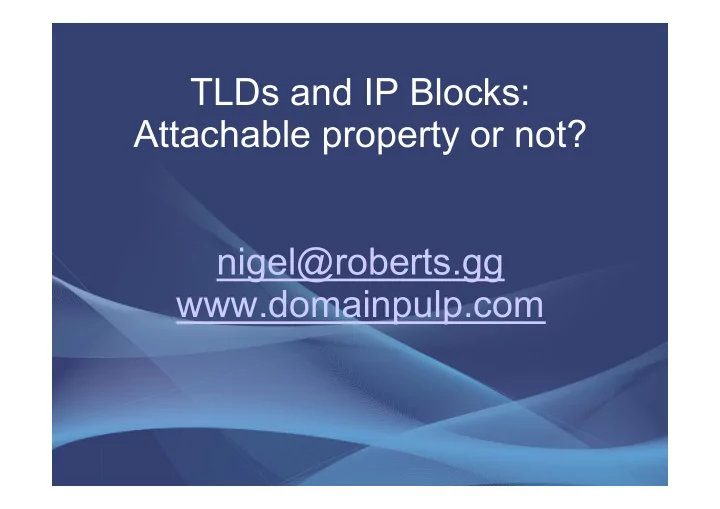

TLDs and IP Blocks: Attachable property or not? nigel@roberts.gg www.domainpulp.com
Story starts • Several terrorist incidents – that were said to be state sponsored • Victims/heirs sue in US courts • Obtain default judgments (after much legal argument)
Story really starts • when they try to enforce • by looking for property • that belongs to the governments of • Iran • Syria • North Korea
June 23, 2014 • Sub-poena served on ICANN – claiming access to documents – and requiring ICANN hand over • several (cc)TLDs (including IDN) • and IP blocks. • ICANN defends
Why do we care? • What is important for ccTLDs collectively? – whether any legal precedent is established – that affects us … • not the outcome of the case.
ICANN says • (cc)TLDs – are not property – might be property, but if they are, they are not attachable – if they are attachable, ICANN cannot transfer them unilaterally • even if they can transfer ccTLDs, this would 'wreak havoc' ('Chicken Little' argument)
ICANN also says • Defendants do not own the ccTLDs • Even if they do own, 'foreign sovereign immunity' applies – Which means ICANN cannot be compelled to hand them over
Basis of argument • In its argument at first instance, submitted early this year, ICANN relied upon – ICP-1; and – GAC Principles 2000 in order to inform the court about the nature of ccTLDs
Court ruled • ICANN was not required to comply with the order • The Court's order has been widely misreported • Nothing was decided about property – So we still don't know whether in US law a top level domain name could be property – But the judge gave a hint
Plaintiffs did not succeed • because even it TLDs are property – 'and they might be' – they would not be the kind of property that you can attach under D.C. law – BUT . . . .
The Appeal • The Plaintiffs have appealed • It seems this is essentially on the basis that the applicable law in D.C. is unclear • when applied to domain names/TLDs.
ICANN's Defence – Filed their defence to the appeal on 28 th Sept 2015 – Containts much the same argument as before – Probably with a good chance of success on the original winning point. – However . . .
Appeal • The appeal is more on law than fact • The most significant factor for the appeal appears to be – how a particular (DC) statute law is to be interpreted (i.e. if a TLD or IP block is property, is it the kind of property that can be seized.
Referral – A procedure exists to make a reference from Federal courts to state courts to get an answer on such issues where it involves the interpretaion of State law. – to European eyes this appears to be analogous to the power of EU Member States court to refer a qualified question to the ECJ in Lux.) – Plaintiffs have applied to do this – ICANN opposed
What next? • Currently arguing over whether to refer the question • Oral argument in the case scheduled for late January 2016. • A refusal to refer to, or an confirmatory answer from the DC court would appear determine the the appeal.
In summary • ccTLDs might be property • Court seemed to think it might possibly, maybe . . . • but we don't know – since it wasn't required for the court to decide this at 1 st instance.
Finally . . . Other US states have different laws Where intangible property CAN be seized . . .
Recommend
More recommend